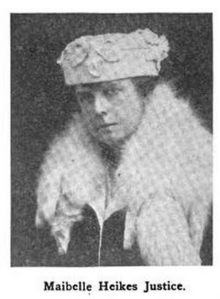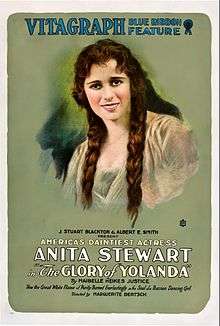Maibelle Heikes Justice
Maibelle Heikes Justice (1871 — March 11, 1926) was an American novelist and screenwriter.

Early life
Maibelle Heikes Justice was born in Logansport, Indiana, the daughter of James Monroe Justice and Grace E. Heikes Justice (later Grace Justice-Hankins). Her father was a lawyer and politician, and an American Civil War veteran.[1] She was educated in New York City and Philadelphia, and spent two years with the military, for which she was given honorary rank of captain in the U.S. Army.[2]
Career

Justice was credited as a writer on over 40 silent films between 1913 and 1925, most of them shorts. Among her notable films was The Post-Impressionists (1913; Hardee Kirkland, dir.), a comedy based on her visit to the Armory Show that year.[3] The Song in the Dark (1914) was about a blind canary and her blind owner.[4]
Her Husband's Honor (1918, working title The Gadabout) starred a fellow Logansport native, actress Edna Goodrich.[5] She visited the "death house" at Sing Sing prison to research her screenplay for Who Shall Take My Life? (1917), a drama about the execution of an innocent man.[6] In 1917 she was commissioned to write a movie about the World War I work of the Red Cross.[7]
Justice published fiction in The Cosmopolitan and other national publications.[8][9] She also wrote a novel, Durand of the Bad Lands, which was adapted for film in 1917, and again in 1925.[10]
Personal life
Her sister Anne Shymer, a chemist and president of the United States Chemical Company, was among the passengers who died in the sinking of the Lusitania in 1915.[11][12] Maibelle Heikes Justice died in 1926, aged 55 years.[13]
Justice inherited a large portrait of a young Abraham Lincoln, The Railsplitter (1860), from her father.[14] She donated it to the Chicago History Museum, where it remains on display.[15]
References
- Jehu Z. Powell, History of Cass County Indiana (Lewis Publishing 1913): 238-239.
- "Scenario Writers and Editors". Motion Picture Studio Directory and Trade Annual: 289. 1921 – via Ancestry.com.
- Eileen Bowser, The Transformation of Cinema, 1907-1915, Volume 2, Part 2 (University of California Press 1994): 268. ISBN 9780520085343
- "Miss Justice in Wider Field" The Moving Picture World (June 24, 1916): 2226.
- "Edna Goodrich Starts 'The Gadabout'" Motography (June 8, 1918): 1092.
- Daniela Bajar and Livia Bloom, "Maibelle Heikes Justice" Women Film Pioneers Project.
- "Red Cross Movie Drama Latest Idea of World War" Pittsburgh Daily Post (August 5, 1917): 31. via Newspapers.com

- Maibelle Heikes Justice, "The Other Man" The Cosmopolitan (May 1913): 787-796.
- Maibelle Heikes Justice, "The Wasp" Green Book Magazine (August 1909): 322-331.
- Larry Langman, A Guide to Silent Westerns (Greenwood Publishing 1992): 128. ISBN 9780313278587
- "Anne Shymer", The Lusitania Resource.
- "Tiding of Lusitania Message from Grave?" Los Angeles Times (May 9, 1915): II1.
- "Dead Woman Named Heir" El Paso Evening Post (October 17, 1930): 1. via Newspapers.com

- "Rare Lincoln Painting Carried in Civil War" New York Times (February 13, 1916): SM7.
- The Railsplitter (1860), Chicago History Museum.